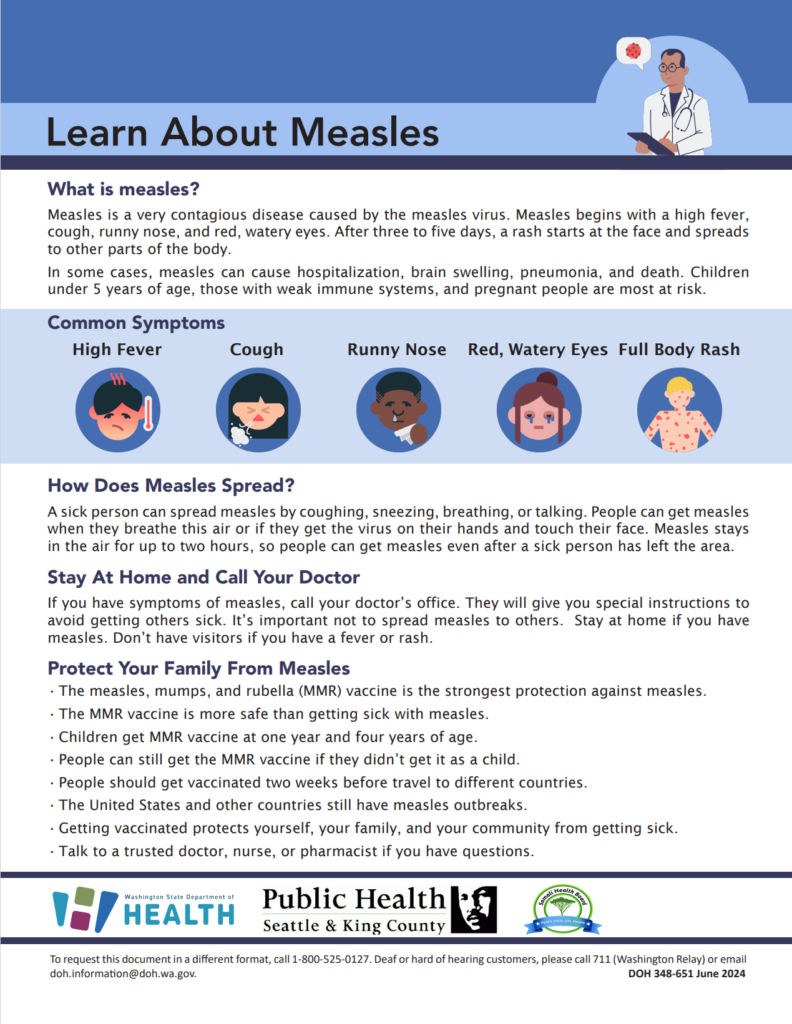Measles is one of the most contagious infectious diseases we can be exposed to. Someone who has been exposed to measles and is not already immune, either because they were vaccinated or had the infection previously, has a 90% chance of developing the disease. Although measles was declared eliminated from the United States in 2000, there have been outbreaks, often caused by susceptible individuals who have traveled to countries where measles is more common and then return to the US, where they infect other susceptible people.
As of May 5, 2025, there have been 935 confirmed cases in 30 states, including several cases in Washington. There have not been any cases in Asotin County. 96% of the cases so far are in individuals who are either unvaccinated or do not know if they have been vaccinated. Hospitalization has been required for 13% of these cases, most of whom are under 5 years of age. Unfortunately, there has also been 3 confirmed deaths in 2025, 2 of whom were unvaccinated school-aged children.
While there is no treatment for measles, vaccination is proven to prevent infection. The MMR vaccine offers lifetime immunity, and you do not need to get “booster shots” like you do with Tdap. 1 dose of MMR is 93% effective, with 2 doses providing 97% prevention from becoming infected with measles. If you do not know if you were vaccinated or had measles, it is not harmful to get another dose of MMR. However, if you know you have had 2 doses of MMR, you do not need a third dose.
Since 1989, the recommendation is for all children to receive 2 doses of MMR. The first dose is given when the child is 12-15 months old and the second dose is given between 4 and 6 years of age. During the 2023-2024 school year, over 90% of Asotin County kindergarten students had all of their required immunizations, including 2 doses of MMR.
For adults born before 1957, it is generally assumed they had measles as a child and therefore do not need a vaccine. For those born after 1957 or who do not know if they had measles as a child, one dose of MMR is recommended. However, 2 doses of MMR are recommended if you are traveling to an outbreak location, have a job where measles exposure is possible (such as in healthcare), or are at high risk for serious illness. High rates of immunization in the county helps to protects those who cannot get the vaccine and prevents community spread.
Measles is contagious 4 days before and 4 days after rash onset. The measles virus can remain in the air and on surfaces for up to 2 hours after the infected person leaves the room. This means you can be exposed to measles without having direct contact with the infected person.
If you think you were exposed to measles, contact your healthcare provider. If you may have been exposed to measles and are showing any symptoms, call ahead before going to your healthcare provider or urgent care so they can take precautions to avoid spreading the illness to others. Early symptoms of measles may look like other illness. The rash does not develop until 3-5 days after other symptoms start.
Measles is a virus so antibiotics will not help. If an infection develops (such as ear infections or pneumonia), then antibiotics may be needed for the infection.
